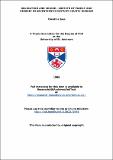Files in this item
Obligation and choice : aspects of family and kinship in seventeenth century County Durham
Item metadata
| dc.contributor.advisor | Wrightson, Keith | |
| dc.contributor.advisor | Houston, R. A. (Robert Allan) | |
| dc.contributor.author | Issa, Christine | |
| dc.coverage.spatial | 489 p. | en_US |
| dc.date.accessioned | 2012-07-09T12:40:30Z | |
| dc.date.available | 2012-07-09T12:40:30Z | |
| dc.date.issued | 1988 | |
| dc.identifier.uri | https://hdl.handle.net/10023/2948 | |
| dc.description.abstract | The thesis seeks to explore alleged differences in kinship and family relations within County Durham, an area of wide geographical, social and economic diversity. A study of recognition that reveals that kinship ties were narrow and fell into a distinctly English pattern, a pattern which appears independent of considerations of wealth. Only the life cycle appears to have influenced patterns of recognition. Wider kin also appear to have been of limited importance as a source of support, with individuals preferring to rely upon the aid of neighbours and members of the nuclear family. This relatively narrow 9attern of recognition and support stands in sharp contrast to the strong ties formed within and through the nuclear family. The detailed study of inheritance, marriage and conflict not only reinforces the earlier findings concerning the limited importance of wider kin but also suggests that strong and specific ties of obligation and expectation governed relationships formed within the nuclear family. Such findings suggest the need to revise the assumption which regard English society as being highly 'individualistic'. | en_US |
| dc.language.iso | en | en_US |
| dc.publisher | University of St Andrews | |
| dc.subject.lcc | HQ616.D9I8 | |
| dc.subject.lcsh | Families--England | en_US |
| dc.title | Obligation and choice : aspects of family and kinship in seventeenth century County Durham | en_US |
| dc.type | Thesis | en_US |
| dc.type.qualificationlevel | Doctoral | en_US |
| dc.type.qualificationname | PhD Doctor of Philosophy | en_US |
| dc.publisher.institution | The University of St Andrews | en_US |
This item appears in the following Collection(s)
Items in the St Andrews Research Repository are protected by copyright, with all rights reserved, unless otherwise indicated.

